Nine Men's Morris
The Game of Merels or Nine Men's Morris
By Catherine WettonNine Men’s Morris or Merels (Merreles) is a simple two-player board game, originating possibly as early as 1400 BC. Variations have been played throughout the ages and there are many different versions. Popular throughout the fourteenth and fifteenth centuries, it’s a great one to play during quieter moments at events. The object of the game is to make as many mills as possible, while making it impossible for your opponent to make a move; by either blocking them in or taking so many pieces they are only left with two.
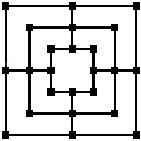
Figure 1: The normal Merels board
Merels is played on a square board, (as shown in Figure 1). The counters move between 24 points on the board (marked with dots in Figure1), but may only move along the drawn connecting lines to adjacent points. Unlike chess or draughts, where the counters are set out in a designated pattern, the players place one of their counters on an unoccupied point on the board in alternating turns, until all nine are placed. Only one counter may occupy any point at any one time. Play continues in alternate moves, each player moving one counter per move, along a line to an adjacent point.
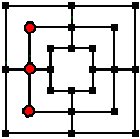
Figure 2: A Mill
The idea of the game, as mentioned above, is to form as many mills as possible. These consist of a horizontal or vertical line of counters along three connecting points (Figure 2). All three counters must belong to one player only. For each mill that they make, they capture (or pound) a counter belonging to their opponent, which may be removed from the board and cannot be brought back into play. A counter cannot be captured if it is within a mill. If a player is unable to move, or has too few counters left to make a mill, that player loses. This would seem easy if you could make and break a mill with each turn. No such luck I’m afraid. The general rule is the same mill cannot be reformed by the same piece in a consecutive turn. But you can move the piece to form another mill.
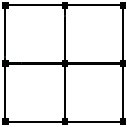
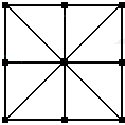
Figure 3: simple Merles boards
There are alternative rules and variations, although the group normally plays the common version. One of the alternatives to the usual rules is that the new mill is made along a separate line. Another alternative is when a player is reduced to three counters, they can move these to any empty point on the board. This may lengthen the game, but can also still produce a stalemate situation.
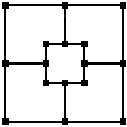
Figure 4: The Five Men’s Morris Board
There are numerical variations of the game, which can be played as an alternative to the popular nine counter game. The boards shown in Figure 3 are simple versions of this game. These are played with only 3 counters, as there isn’t quite enough room for nine! The second board featured in Figure 3 may be played with four counters.
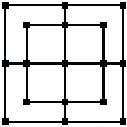
Figure 5: The Seven Men’s Morris Board
A game of Four Men’s Morris can be played on a slightly simpler version of the common board (Figure 4) and Five Men’s Morris on another variation (Figure 5)
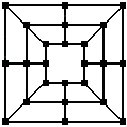
Figure 6: The Twelve Men’s Morris Board
Figure 6 shows the Twelve Men’s Morris board, a slightly more complex version of the usual geometric board. In all versions of the game, from Three Men’s Morris through to Twelve Men’s Morris, mills are made as in the common game; by forming three counters in a row along a drawn connecting line.
Here be the Rules of the game knewn as the Nine Mens Morris
By Andronicus Howeth of Deorabyshire
There shall be nine pieces and ye pieces there will be nine. Ten is one too many unless this be a spare. Eight is also wrong not having enough for to playeth ye game of nine mens morris. Eleven is right out and ye game shall be unplayable and wouldeth be called eleven mens morris which be not the name of ye game. Therefore unto you I sayeth nine pieces be needed for ye game to be played.
To begin ye game of nine mens morris, one piece is used from each colour for two different colours are required. This piece is then held in ye fair and goodly hands of a fair and just persone. Ye players then chooseth a hand and this decides ther colour for the darker colour shall play first. For this reason and only I say for this reason more than nine pieces could be useful to decide whoeth goes first in ye grete game. I urge ye, lest ye be not playing, then to discard here extra piece for this be nine mens morris and not ten mens morris either.
However, in some regions, though I know not why, there be a custom that one piece only is used and hidden in ye hand. The other player then guesses which hand this be in and if he be right then he may play ye grete game first. However, this must be used with caution for unfair folk, robbers and mischievous persones be known to cheat this form of starting ye game and is only used in the provinces were such brigands live.
However, in some regions, though I know not why, there be a custom that one piece only is used and hidden in ye hand. The other player then guesses which hand this be in and if he be right then he may play ye grete game first. However, this must be used with caution for unfair folk, robbers and mischievous persones be known to cheat this form of starting ye game and is only used in the provinces were such brigands live.
So to the grete game then, the persone who has ye darker pieces, for I shall not discuss with ye the baser form of starting ye game, places a piece anywere upon ye board with a view to achieving masterery over his lower born opponant if god wills it. Each player shall place there pieces one at a time upon ye points of ye board, which be a simple but cunningly designed achievement.
If ye player forms a row of three pieces, then a grete cry of mill may be shouted along with much huzzah and joye for he then may remove one of his lower born opponents pieces, but I say unto you not one that is within a mill itself, for this be protected by the devil himself.
When all ye pieces have been so placed, and if ye lower born opponant still has pieces remaining of course, play shall continue by moving said pieces, in tern mind you, to adjacent vacant point along a line. The object of this of course is to make ye low born opponant suffer grete shame and make more of ye mills. For as we goodly folk knoweth, mills are a good and godly thing and will make ye a grete player of the game of nines mens morris.
Your own mill can be made or broken at will of course , an opponents piece shall be smitten each and every time this good fortune be made, and a mill be formed for as already sed, mills are a good and godly thing and a grete cry of mill made be made each and every time, to your low borns grete shame too.
As this be a fair and just district, this game also be played with the rule of hop, for ther be good brewers here. Ye may also captur a piece by hopping over it to a vacant point immediately beyond it, but not if this be a corner for this is not vacant. I suggest unto thee that this rule be introduced during ye game if it be to ye advantage and not before the game begineth, for ye needeth not tell ye lowly born opponant anything he need not knew.
If your ungodly opponant has only three pieces left, then haha, he be in a good mess and he must move even this means losing a piece, and good riddance too.
If you have blocked all of ye opponents pieces so he cannot move or if ye opponant has only two pieces remaining then, a wondrous cry may be made for ye have won ye grete game and god smiles upon ye. Ye may taunt ye lowly opponant and this be a good thing for he be a lowly peasant with no cultur or learning of ye books.
This then be the rules for the grete game of nine mens morris and god be with ye.
